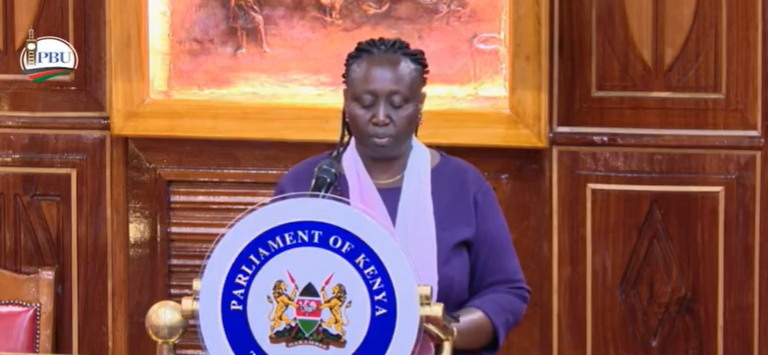Manual lending reset wipes women’s credit scores – Cheptumo

In a candid appearance before the Senate Cabinet Secretary for Gender Hanna Cheptumo acknowledged that the government’s decision to revert to a manual lending model for the Women Enterprise Fund has unintentionally erased years of credit history for many long-standing women’s groups.
The move to abandon the digital platform, which had been in place since 2020, was intended to increase accessibility for women in rural and underserved areas. However, it has led to major setbacks for thousands of women who had developed solid borrowing records through the previous system.
“Following the reversion to the manual lending model in December 2024, the Fund has acknowledged the valid concerns raised by long-standing women’s groups regarding the loss of credit history and scores built over several years—particularly prior to the digitization phase,” Cheptumo told senators on Wednesday, May 21, 2025.
“We understand that many groups have spent years building trust and financial discipline through digital repayments and tracking. Their fear of being treated as first-time borrowers under the manual system is valid, and we are working to address that,” the CS stated.
Senators’ concerns
Senators pressed Cheptumo on the rationale behind the policy shift, with some accusing the ministry of poor planning and lack of stakeholder engagement.
Senator Agnes Kavindu of Machakos asked pointedly, “Why was the system changed without first safeguarding the data? These women are not just statistics; they are the backbone of community enterprise.”
In response, Cheptumo admitted that the transition had technical gaps but emphasized that it was made in good faith to close digital exclusion gaps.
“We did not anticipate the scale of the data disconnect. While digitization has its benefits, it also left out many women, especially in remote areas with no internet or smartphones. The manual model was meant to bridge that gap,” she explained.
However, Cheptumo assured the Senate that her ministry, in collaboration with the Treasury and ICT counterparts, was developing a hybrid model that would merge both systems to ensure continuity in credit scoring.
“We are now working on a system that integrates manual records with historical digital data so that no woman loses her financial identity,” she said. “We want to assure all women’s groups that their effort has not gone to waste.”
Senators welcomed the proposed hybrid approach but demanded timelines and accountability mechanisms.
“Hope is not a strategy,” Senator Esther Okenyuri said. “We want to know when the hybrid system will be ready and how the ministry will ensure all records are accurately restored. We can’t gamble with the livelihoods of our women.”
Senator Godfrey Osotsi of Vihiga raised concerns over transparency in the fund’s operations since the shift to manual processing.
“There’s been an uptick in complaints about bureaucratic delays and favoritism. Digital systems are not just efficient because they are traceable. Are we losing that accountability?” he asked.
Cheptumo conceded that manual systems carried risks of inefficiency and corruption, adding, “That’s precisely why a hybrid model is necessary. We cannot afford to sacrifice accountability for inclusivity—we must strike a balance.”
The Cabinet Secretary pledged to deliver a comprehensive report to the Senate within 60 days detailing the restoration plan, the new hybrid structure, and a revalidation process for women’s groups whose data was lost or compromised.
“Your records matter. Your journey matters. We are committed to rebuilding the system in a way that honors your resilience and sacrifices,” the CS assured.












